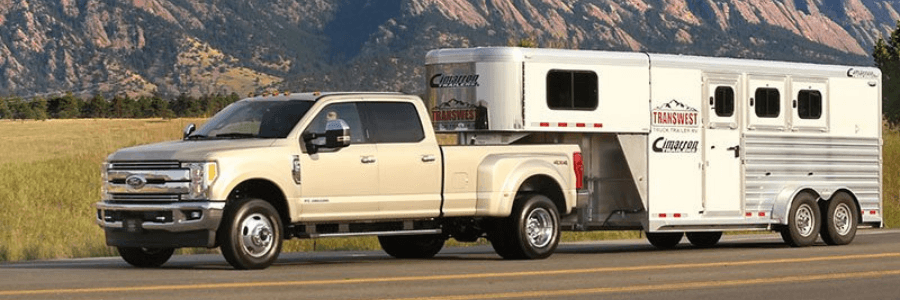Your Guide to Owning a Fifth-Wheel

There are many reasons why fifth-wheel trailers are so popular among BC RVers. Not only are they spacious, comfortable, and full of luxury amenities, but they’re also more affordable than comparable motorhomes. Not to mention, fifth-wheels are much easier to tow while travelling along BC highways at high speeds. Additionally, these versatile trailers are the perfect detachable base camp that you can leave behind on campgrounds as you explore your surroundings in your towing vehicle. If all these characteristics speak to your RV needs and you’re thinking of purchasing a fifth-wheel trailer, the team at South Thompson is here to help. Let's take a deep dive into what owning one of these popular trailers entails with our comprehensive fifth-wheel guide.
What is a Fifth Wheel?
A fifth-wheel trailer is a lot like a traditional travel trailer in terms of look, design, and features and is designed to be towed by a pickup truck. However, it is distinct from traditional travel trailers or campers due to its unique coupling mechanism, called a fifth-wheel hitch, which connects to a hitch installed in the bed of the towing vehicle.
The fifth-wheel RV resembles a large box-shaped trailer with an elevated front section that overhangs the towing vehicle when attached. This design provides additional interior space compared to standard tow-behind trailers. Inside a fifth wheel, you’ll find amenities similar to a small apartment, including a bedroom, kitchen, living area, bathroom, and sometimes multiple slide-out sections to expand the interior space when parked on your favourite campgrounds.
Because of its unique hitch system, part of the fifth wheel hangs over the truck’s bed, dramatically changing how it is towed. This approach offers some significant advantages over connecting a trailer to a bumper hitch. For instance, it significantly reduces the swaying and bouncing of the trailer, enhancing safety and control, especially at higher speeds. The fifth-wheel configuration also allows for a better-turning radius, which is helpful for maneuvering through confined or narrow spaces.
Hitching a Fifth-Wheel
Attaching a fifth-wheel trailer to your truck is admittedly more complex and time-consuming than hitching a travel trailer to the bumper. This process might be intimidating and frustrating for newcomers, demanding considerable patience to ensure accuracy, as rushing could result in potential damage to both the truck and the camper. The introduction of backup cameras in newer vehicles has proven to be helpful in expediting and facilitating the hitching process. The basic process for hitching a fifth wheel is as follows:
-
Park on a level surface
-
Open the 5th wheel jaws
-
Slowly back up
-
Adjust trailer jacks
-
Engage the 5th wheel jaws, and
-
Test the connection
Towing a Fifth-Wheel
As we mentioned earlier, unlike other travel trailers, fifth-wheels are designed to be towed by full-sized trucks only. An SUV simply won’t do. This is because the unique coupling used to connect the two vehicles is bolted to the bed of the truck. But more importantly, it's crucial to have a truck with sufficient towing capacity to safely haul the trailer, making the weight of the RV a pivotal factor.
Given their larger size compared to regular travel trailers, fifth-wheels can also significantly increase in weight. Some may surpass 15,000 pounds, requiring a heavy-duty truck for safe towing. Before making a purchase, it's essential to verify the Gross Vehicle Weight Rating (GVWR) of the trailer and compare it against your truck's towing capacity. If the GVWR exceeds the towing capacity, you'll either require a larger truck or a smaller camper. Additionally, it's important to note that as you load cargo, passengers, and water into the fifth wheel's holding tanks, its weight will rise. Consequently, the tow vehicle must be capable of accommodating this added weight.
Parking a Fifth-Wheel
When it comes to parking a fifth wheel, more specifically backing one up, it’s all about geometry. But don’t let that scare you if you’re not a math wiz! The main concept you want to understand is usually the one that causes folks the most frustration. The trick is to turn your wheel in the opposite direction to the way you want the trailer to go. That way, if you turn the wheel to the right, the trailer will go to the left. The best technique to do this is by holding your steering wheel at the base rather than at the top like you normally would. This allows you to trick your mind into thinking your hand is moving to the left, for example, while the wheel is actually turning clockwise to the right! Once you get moving, you do want to correct to the other direction to avoid trailer jack-knifing.
Having a person act as a guide can also be quite helpful. Just don’t let it ruin your marriage! Pro-tip: communicate with each other over the phone to avoid yelling and miscommunication, which is often what leads to more frustration!
Fifth-Wheels Made Simple
At South Thompson RV, we get lots of first-timers excited to explore our great nation in comfort and style. If you have any questions about fifth wheels, travel trailers, campers, etc., our team can always offer helpful tips and advice when you come to check out what’s on the lot! Check out our exciting inventory of all-new fifth wheels and other RVs today!